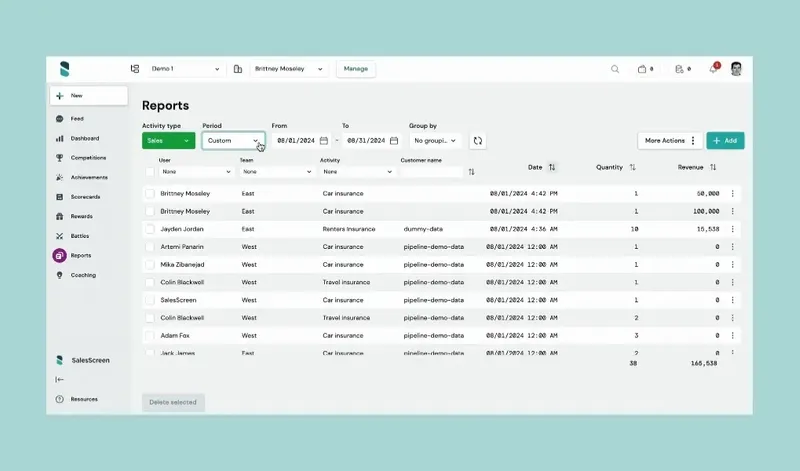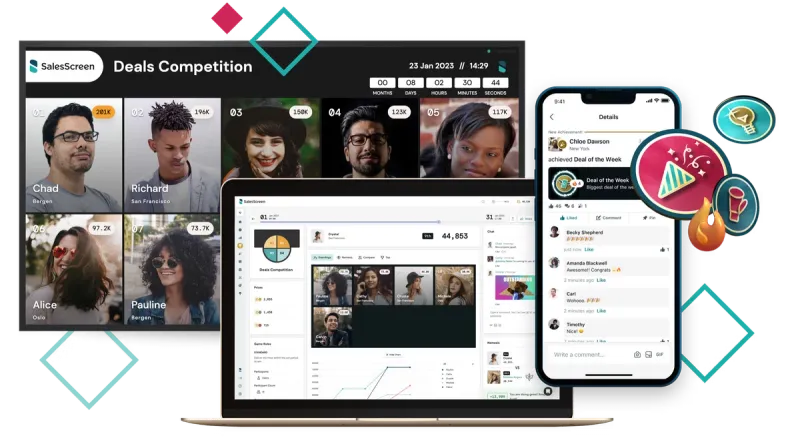
12 Sales Coaching Techniques and Tips to Boost Team Performance
Unlock proven sales coaching techniques and tips to boost team performance and motivate sales reps with actionable strategies for real results.
0 min read.
Effective sales coaching is the number one lever for boosting sales performance. When done right, coaching transforms not only individual sales reps but entire teams, driving higher revenue, greater engagement, and a culture of continuous improvement. In a world where sales cycles are more complex, buyer expectations are higher, and competition is relentless, coaching a sales team is no longer optional. It is essential.
Key Takeaways
- Effective sales coaching is essential for driving higher revenue, engagement, and a culture of continuous improvement.
- Modern sales leaders must adapt to remote work, data overload, and rising expectations by building a visible, motivating coaching culture.
- The best sales coaching techniques focus on clear KPIs, data-driven feedback, gamification, peer learning, and personalized support.
- Measuring sales coaching effectiveness requires tracking quota attainment, deal size, activity levels, engagement, progress visibility, and recognition frequency.
- Overcome common challenges by scaling personalized coaching, identifying what works, maintaining engagement, and preventing burnout.
- A strong coaching culture is built on trust, recognition, and consistent rituals that connect every rep to team success.
- SalesScreen empowers sales teams to implement these sales coaching tips and techniques with real-time dashboards, automated recognition, and gamified contests.
The Current State of Sales Coaching
Today’s sales leaders face a unique set of challenges. Remote and hybrid work have changed the way teams connect. Data is everywhere, but not always actionable. Sales reps crave feedback and recognition, but traditional approaches often fall flat. The opportunity is to build a coaching culture that is data-driven, visible, and motivating, one that empowers every rep to reach their full potential.
In this guide, we share proven sales coaching techniques and tips for modern teams, all grounded in SalesScreen’s experience helping thousands of organizations improve sales coaching and elevate performance. Whether you are a frontline manager or a revenue leader, you will find actionable strategies you can implement right away.
Why Sales Coaching is Critical
Sales coaching is not just a buzzword. It is the engine that powers high-performing teams. Research shows that sales reps who receive as little as three hours of coaching per month exceed quota by 7 percent, increase revenue by 25 percent, and improve close rates by 70 percent.
The impact of coaching sales teams goes beyond the numbers. When reps understand how their performance is measured and how they contribute to the team’s success, they feel more fulfilled and bring greater energy to every customer interaction. Coaching builds trust, accountability, and a sense of belonging. It turns managers into mentors and teams into communities.
In today’s environment, where change is constant and pressure is high, coaching provides the clarity and support reps need to adapt and thrive. It is not about micromanaging or checking boxes. It is about unlocking potential and building resilience.
12 Core Sales Coaching Techniques To Boost Reps' Performance
1. Set Clear, Motivating KPIs
Every great coaching relationship starts with clarity. Sales reps need to know exactly what is expected of them and how their success will be measured. When KPIs are clear, relevant, and motivating, reps are more engaged and driven to succeed.
Focus on a handful of meaningful metrics such as meetings booked, deals closed, or pipeline created. Make these KPIs visible to the entire team. Use dashboards, leaderboards, and wall of fame displays to keep everyone aligned and inspired.
Less is often more. Too many KPIs can dilute focus and create confusion. Choose the metrics that matter most for your business and revisit them regularly as your strategy evolves.

2. Coach with Data, Not Gut Feelings
Gone are the days when coaching a sales team was based on hunches or anecdotal feedback. Today’s best coaches use data to drive every conversation and decision.
Track key activities and outcomes for each rep. Use performance dashboards to identify trends, spot bottlenecks, and highlight growth opportunities. When you sit down for a coaching session, bring the data with you. Show reps where they are excelling and where there is room for improvement.
Data-driven coaching is not about catching mistakes. It is about creating a shared understanding of what is working and what is not. When reps see the numbers for themselves, they are more likely to take ownership and act on feedback.
3. Make Progress Visible
Visibility is a powerful motivator. When sales reps can see their progress in real time on leaderboards, dashboards, or digital wall of fame displays, they are more likely to stay engaged and push for their goals.
Performance should never be a mystery. Make it easy for reps to track their own achievements and compare their progress with peers. Celebrate milestones, big and small, and keep the energy high throughout the sales cycle.
Use visual tools to highlight daily, weekly, and monthly achievements. Recognize not just top performers, but also those who are making steady progress or overcoming obstacles.

4. Deliver Timely, Focused Feedback
Feedback is the cornerstone of effective sales coaching. But not all feedback is created equal. To drive real improvement, feedback needs to be timely, specific, and actionable.
Do not wait for quarterly reviews or annual check-ins. Make feedback a regular part of your coaching rhythm. Focus on one or two key behaviors at a time, and tie your feedback directly to observed actions and outcomes.
Use in-app notifications, quick check-ins, or short video messages to deliver feedback in the moment. The sooner reps hear what is working or what needs to change, the faster they can adjust.
5. Recognize and Celebrate Wins
Recognition is more than a feel-good gesture. It is a strategic lever for engagement and performance. When reps feel seen and valued, they are more likely to stay motivated and push through tough times.
Celebrate both individual and team achievements. Use public shout-outs, digital badges, or even small rewards to highlight progress. Recognition is especially important when performance dips or challenges arise. A well-timed “great job” can make all the difference.
Build recognition into your daily and weekly routines. Make it visible, meaningful, and tied to your core values.

6. Gamify the Coaching Process
Gamification is not just about making work fun. It is about driving engagement, accountability, and results. By turning key activities into friendly competitions, you can motivate reps to push harder and celebrate their achievements along the way.
Use contests, challenges, and leaderboards to keep the energy high. Offer tiered rewards so that everyone has a chance to win, not just the top performers. Gamification also makes it easier to track progress and provide instant feedback.
SalesScreen’s platform is built for gamification, with features like real-time leaderboards, automated contests, and customizable rewards. It has never been easier to keep your team engaged and focused on what matters most.

7. Encourage Peer Learning and Success Sharing
Some of the best sales coaching happens between peers. When reps share their successes, challenges, and strategies, everyone benefits.
Create opportunities for reps to learn from each other through team meetings, peer coaching sessions, or digital forums. Highlight internal success stories and encourage reps to share what is working for them.
Make peer recognition part of your culture. Encourage reps to call out each other’s achievements and share tips for overcoming common obstacles.
8. Focus on One Improvement at a Time
It is tempting to tackle every issue at once, but real progress comes from focusing on one skill or behavior at a time. Prioritize the most important area for growth and build your coaching plan around it.
Set clear, achievable goals and track progress regularly. When reps see tangible improvement in one area, they are more likely to stay motivated and tackle the next challenge.
Use micro goals and short-term challenges to keep reps focused and engaged. Celebrate each win before moving on to the next.
9. Build a Culture of Healthy Competition
Competition is a natural driver of performance. But it needs to be healthy, inclusive, and motivating.
Design contests and challenges that give everyone a chance to win, not just the usual top performers. Mix up the rewards and criteria to keep things fresh. Recognize effort and improvement, not just outcomes.
Use random draws, tiered rewards, or “most improved” awards to keep the competition positive and engaging.

10. Scale Coaching with Consistency and Rituals
Consistency is key to building a coaching culture. Use regular one-to-ones, team check-ins, and repeatable rituals to reinforce habits and keep everyone aligned.
Document your coaching process and make it easy for managers to follow. Use templates, checklists, and digital tools to streamline your workflow.
Automate reminders for coaching sessions, feedback cycles, and recognition moments. The more consistent your approach, the stronger your culture will become.
11. Personalize Coaching to Each Rep
Every rep is unique. Adapt your coaching style to fit their learning preferences, motivations, and goals.
Take the time to understand what drives each team member. Some reps thrive on public recognition, while others prefer private feedback. Some need detailed guidance, while others want autonomy.
Use personality assessments, regular check-ins, and open-ended questions to tailor your coaching approach.
12. Keep Reps Engaged During Slumps
Even the best reps hit rough patches. Use data to spot disengagement early and intervene with recognition, support, and targeted coaching.
Normalize struggle by sharing stories of peers who have overcome similar challenges. Focus on small wins and incremental progress to rebuild confidence.
Real-time progress tracking and automated recognition make it easier to keep reps engaged, even when the going gets tough.
How to Measure and Improve Sales Coaching Effectiveness
You cannot improve sales coaching if you do not measure it. To ensure your sales coaching techniques are driving real results, track both leading and lagging indicators:
- Quota attainment: Are more reps hitting their targets each quarter? Tracking quota attainment helps you understand if your coaching of sales reps is translating into improved performance and consistent goal achievement across the team.
- Deal size and win rates: Are deals getting bigger and closing faster? Monitoring average deal size and win rates shows whether your sales coaching tips are helping reps move opportunities through the pipeline more efficiently and close higher-value business.
- Activity levels: Are reps making more calls, booking more meetings, or creating more pipeline? Increased activity often reflects higher engagement and better adoption of coaching sales techniques, which should ultimately lead to more opportunities and revenue.
- Engagement: Are reps participating in coaching sessions, contests, and recognition programs? High participation rates in coaching activities and gamified programs indicate that your approach to coaching sales teams is resonating and driving involvement.
- Progress visibility: Are improvements visible on dashboards and leaderboards? Making progress transparent helps reinforce positive behaviors and keeps the team motivated. Look for upward trends and healthy competition as signs of effective coaching.
- Recognition frequency: Are you celebrating both effort and achievement regularly? Frequent recognition, both for hitting targets and for demonstrating desired behaviors, boosts morale and encourages ongoing improvement.
Use dashboards and reports to monitor trends over time. Share results with your team and use the data to refine your coaching strategy. Consistent measurement and open communication are key to improving sales coaching and sustaining high performance.
Common Sales Coaching Challenges and How to Overcome Them
1. Scaling Personalized Coaching
As teams grow, it becomes harder to provide individualized support. Use data and technology to tailor feedback and coaching at scale. Automate routine tasks so you can focus on high-impact conversations. Leverage coaching platforms to deliver targeted insights, track progress, and ensure every rep receives relevant, actionable guidance, no matter the team size.
2. Identifying What Works
Not every strategy will work for every team. Share and replicate internal success stories to spread best practices. Use data to identify top performers and analyze what sets them apart. Regularly review successful approaches, document them, and create playbooks so proven sales coaching techniques can be adopted and adapted across the entire organization.
3. Maintaining Engagement
Burnout and disengagement are real risks, especially in high-pressure environments. Gamify the process, keep recognition frequent, and focus on incremental wins to sustain motivation. Encourage friendly competition, celebrate milestones, and provide ongoing feedback to keep energy high and ensure reps feel valued and connected to team goals.
4. Avoiding Burnout
Do not overload reps with too many goals or initiatives at once. Focus on one improvement at a time and celebrate small wins along the way. Prioritize well-being, encourage regular breaks, and maintain open communication so reps can share concerns early and receive support before stress becomes overwhelming.
Building a High-Performance Coaching Culture
A true coaching culture is built on trust, visibility, and shared success. Leaders set the tone by making progress visible, recognizing effort early, and connecting each rep to the team’s broader goals.
Rituals like regular check-ins, public recognition, and friendly competitions reinforce the habits that drive performance. When coaching becomes part of your daily rhythm, it stops feeling like a chore and starts driving real results.
Take Your Coaching to the Next Level
The most successful sales teams do not leave coaching to chance. They combine data-driven insights, real-time feedback, recognition, and gamification to create a culture where everyone can thrive.
Ready to put these sales coaching techniques and tips into action?
Implementing the right coaching strategies is the key to unlocking your team’s full potential. Whether you’re refining your feedback, gamifying your process, or tracking progress in real time, every step brings you closer to a culture of excellence. If you’re ready to elevate your approach and see measurable results, explore how SalesScreen can support your journey.







